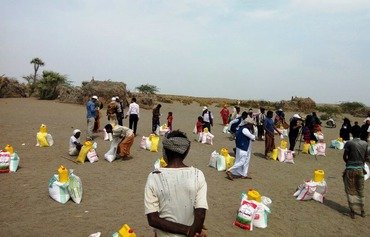Yemen's children are the most affected by the country's ongoing war, according to UNICEF, as they are vulnerable to malnutrition, physical and psychological illness and social ills such as recruitment by armed groups and early marriage.
As famine looms in Yemen, the number of children at risk of malnutrition is expected to increase, UNICEF said in a March report, noting that more than 462,000 children are suffering from severe acute malnutrition at present.
The number of people suffering from extreme poverty and malnutrition is growing, the UN agency said, as nearly 80% of households are heavily indebted, and half the country's population lives on less than $2 a day.
The decline in household income has given rise to child recruitment by all parties to the conflict, as well as an increase in early marriage, UNICEF said.
More than two-thirds of Yemeni girls were married before the age of 18, compared to 50% before the conflict escalated, the agency said, adding that armed groups are increasingly recruiting children as the fighting intensifies.
'A forgotten humanitarian tragedy'
"UNICEF issued its report on the status of children in Yemen after two years of war to remind the world of a forgotten humanitarian tragedy in Yemen, whose victims are children," said UNICEF spokesman in Yemen Mohamed Assadi.
The deterioration in humanitarian and living conditions, coupled with the decline in health and education services, have had a direct impact on children and have increased their suffering, he told Al-Mashareq.
"We urge the parties to the conflict to reach a peaceful solution and a political settlement that guarantees citizens a decent life and allows humanitarian organisations to reach those in need of aid and relief, and enables displaced people to return to their homes and regions," he said.
He called on the international community to intensify its financial support and respond to Yemen's appeal for humanitarian assistance in a way that guarantees the provision of required assistance in all areas.
The war has had a direct adverse impact on the health sector, Ministry of Health spokesman Abdul Hakim al-Kahlani told Al-Mashareq.
According to a recently concluded study, he said, the war in Yemen has set the health system back 10 years, and the infant mortality rate among children under the age of five has risen sharply.
"This is a serious indicator of the deterioration of the health situation in general," he said, noting that children face numerous risks as a result of the war.
The most serious of these is the increase in suffering and rise in poverty due to economic hardships, which threaten children's health and future, he said.
The war also has serious psychological effects on children, he said, in addition to the risk of famine and the spread of diseases such as cholera, dengue fever, malaria and others, to which children are the most vulnerable.
Increase in the number of orphans
A recent survey conducted by the Orphans Development Foundation revealed that the war has produced more than 79,155 orphans.
In a report issued in early April, the foundation said that "aside from the shortened lifespan, manifold causes of death and widening reach of the tragedy that has hit the majority of Yemeni citizens, there is a different kind of suffering experienced by more than one million poor children whose fathers have died".
"Children have been hit the hardest by the war, even though they have no influence or bearing on it," executive director Adel al-Usaimi told Al-Mashareq.
"Even harder hit are the country's orphans, whose number has doubled as a direct result of the war," he said.
The foundation is trying to alleviate the suffering of orphaned children through various education and health programmes, he said.
These include a partnership project to prevent children from dropping out of school and a programme to provide vocational training to 1,000 children between the ages of 10 and 20 in various fields to enable them to obtain jobs.
"This is designed to help them earn a living amid these critical circumstances," al-Usaimi said.
Increase in recruitment of children
The Siyaj Organisation for Child Protection estimates that the number of children recruited and thrust into armed conflicts in Yemen has increased more than eight-fold over the past two years, organisation head Ahmad al-Qureshi told Al-Mashareq.
This will have "direct, disastrous consequences for children and society in general, now and in the future", he said.
Child recruitment became more prevalent in 2015 and 2016 as the conflict expanded to encompass more than 16 provinces, compared to six provinces before 2015, he said.
The increase in poverty and displacement, reduction in sources of income and absence or weakness of government authority, as well as the Houthis' (Ansarallah) control of the levers of power all have been contributing factors, he said.

![Yemeni children line up to secure water for their families. The ongoing war has significantly worsened conditions for children across the board, aid organisations say. [Faisal Darem/Al-Mashareq]](/cnmi_am/images/2017/05/02/7725-yemen-kids-water-600_384.jpg)






We the Yemenis don't need assitance. As to marriage, it's better than adultery. [Gibberish]
Reply1 Comment(s)